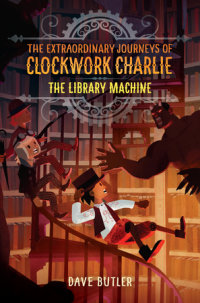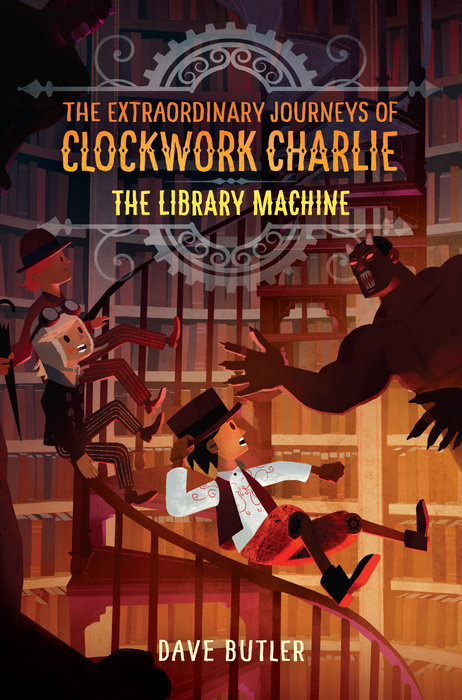You knock, Ollie,” Charlie said. “I need my hands to hold the divining rod.”
The divining rod was a length of metal wire with his brother Thomas’s scarf wrapped around it. It had been enchanted by the dwarf dowser Thassia, so it indicated the direction of Thomas. Charlie and his friends had used the rod to follow Thomas across the North Sea (stowed away in crates in the hold of a cargo ship) and western Germany (mostly on foot, but once in the back of a hay wagon) to a town called Marburg (according to a sign at the edge of town). All the people calling out across the boulevard on which they stood, or chatting to each other as they strolled beneath green trees, were speaking a language Charlie didn’t understand.
German, probably.
Ollie raised an arm to rap on the door, but hesitated. “Only what if they don’t speak English?”
Charlie and his friends stood beside a neat house, three stories tall. The house sheltered in a green garden,…
You knock, Ollie,” Charlie said. “I need my hands to hold the divining rod.”
The divining rod was a length of metal wire with his brother Thomas’s scarf wrapped around it. It had been enchanted by the dwarf dowser Thassia, so it indicated the direction of Thomas. Charlie and his friends had used the rod to follow Thomas across the North Sea (stowed away in crates in the hold of a cargo ship) and western Germany (mostly on foot, but once in the back of a hay wagon) to a town called Marburg (according to a sign at the edge of town). All the people calling out across the boulevard on which they stood, or chatting to each other as they strolled beneath green trees, were speaking a language Charlie didn’t understand.
German, probably.
Ollie raised an arm to rap on the door, but hesitated. “Only what if they don’t speak English?”
Charlie and his friends stood beside a neat house, three stories tall. The house sheltered in a green garden, lovely with ordered shrubs and rows of vegetables. To one side rose a retaining wall of enormous stone slabs propping up the side of the mountain. Above the wall climbed tier upon tier of wood-and-plaster houses, and at the top Charlie saw the spires of a castle, built of orange stone. On a second side of the house and its garden loomed a squared-off, high-gabled stone building with tall, peaked windows and multiple rooftops. Its door was tiny and shut, but the building was sunk into the side of the mountain, so perhaps it had other doors, higher up. To the third side was the boulevard, paved with bitumen concrete and trafficked by steam-puffing carriages.
On the fourth side stood a building of astonishing beauty. A cupola rising above its center showed eight circular windows, each with the stained-glass image of a six-pointed star; another six-pointed star jutted from a metal rod above the cupola, like a weather vane. The main body of the building beneath the cupola bore further six-sided stars in stained-glass windows, and had a rooftop that rose and fell in a symmetrical pattern that created a shape like a star with eight sides. Broad steps climbed from the pavement in front of the building up to its main entrance, a grand set of recessed double doors.
“Someone better knock, boyo,” Lloyd Shankin said. “I’ve an uncomfortable feeling on me, and it’s got something to do with that big machine.”
The Welsh dewin--the word meant “wizard,” and like other Welsh wizards, Lloyd Shankin sang all his spells--nodded down the street past the large building. Entering town along the same boulevard Charlie and his friends had traveled came something that looked like two gigantic gearwheels, rolling forward and holding suspended between them a metal carriage. The machine reminded Charlie uncomfortably of the London Eye, the gigantic leisure wheel where his bap had died.
And it had a skull and crossbones painted on the side.
“I’ll do it.” Heaven-Bound Bob’s grin was as wide as her face. “I’m accoutered to people misunderstanding me.”
“Accustomed, Bob,” Ollie said.
Bob shrugged and knocked on the wood, worn smooth with age. Dark timbers framed the walls of the house, which were plastered white. A lamp hung on each side of the door, and the two stories above the ground floor each jutted slightly out, supported on more dark timbers, creating a sheltered porch on which Charlie and the two chimney sweeps stood.
Lloyd Shankin, who was taller, stood on the walk behind them. Natalie de Minimis, the fairy warrior and rightful heir to the throne of the pixie realm of Underthames, hovered beside him.
From inside the house came the steady rum-pum-pum of percussion instruments, and strings being played over them.
Charlie lowered the rod, tried to make it look inconspicuous. Too bad it was a wire; a length of wood might have looked like a walking stick. Instead Charlie appeared to be carrying a bent rapier, or a fire poker.
But the dowsing rod had definitely pointed at this house. He’d walked around it three times to be sure, and the rod continually tugged at the earth when pointed at the house. And, specifically, at one of the upper stories.
Thomas was inside; there could be no doubt.
The string instruments stopped, though the drums continued.
A man with trimmed facial hair and a small round cap answered the door holding a violin and its bow in one hand. He gave a similar impression to the house: his waistcoat was elegant, but worn like the dark timbers, and although his shirtsleeves were white, a couple of the buttons looked slightly mismatched. His beard was dark, but streaked with hints of gray. White tassels hung down beneath his waistcoat in a neat fringe.
“Guten Tag!” His eyes twinkled merrily, and his voice boomed. Charlie thought Guten Tag must mean “good day” or “hello” in German; he’d never heard anyone say good day and sound so much like they meant it.
“’Ere now.” Bob stuck her hands in the pockets of her peacoat and smiled. “Any chance you speak English?”
“But of course!” the violinist cried.
“Ain’t no of course about it.” Ollie grimaced and dug at the wood of the porch with his boot.
“Are you not German?” Charlie asked.
The man laughed, then looked thoughtful. “That may turn out to be a very good question.” He brightened. “But England, I love England! I’m a Cambridge man myself.”
“A toff.” Ollie frowned.
“A toff can be an excellent chap, my china,” Bob chided her friend.
Ollie snorted.
“Excuse me.” Lloyd Shankin removed his broad-brimmed black hat from his head and pressed it to his chest; this made him look less like a scarecrow and more like an undertaker, dressed in black and pale from working indoors. “Are you a rabbi?”
“I am!” The violinist’s answer burst from him with a joyous smile. “Levi Rosenbaum, at your service.”
“Lloyd Shankin.” One of the dewin’s eyes swiveled around as if he were trying to look at his own ear.
“What’s a rabbi, then?” Ollie asked.
“Like a preacher, or a priest. A Jewish one.” Charlie’s own knowledge of rabbis came strictly from books, but he wanted to show Rabbi Rosenbaum he wasn’t totally ignorant. “Sort of like Lloyd.”
“Like Lloyd.” Ollie nodded. “That might be all right, then.”

